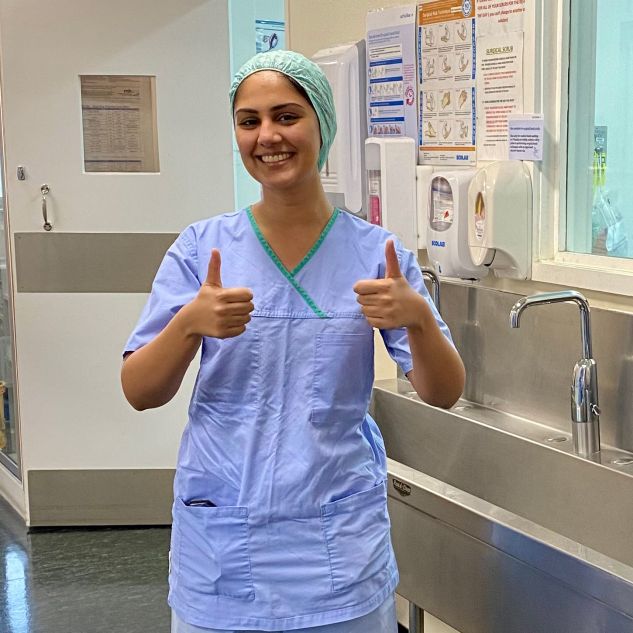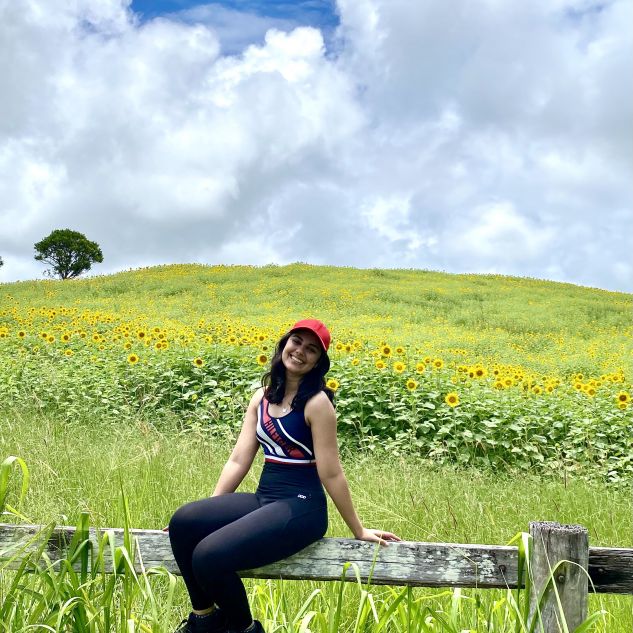
A formative final year experience
Sixth-year JCU Medical student Anoushka Kothari had it all worked out. After completing her degree at the end of this year, she would return to her hometown of Brisbane to pursue a career in surgery at a tertiary hospital. At least, that was the plan before she set off on her sixth-year placement on the Atherton Tablelands.
“As I grew up in Brisbane, my intention was always to return. While that was the initial plan, I have developed a passion and love for rural medicine,” Anoushka says.
Over the first five years of her degree, Anoushka became aware of the need and opportunity for doctors to go rural. The understanding took on a new dimension during her first sixth-year placement, where she could put five years of acquired skill and knowledge to work, while massively growing as a future doctor.
“I have seen the growing need for rural doctors firsthand. The workload is immense and it is important we distribute resources equally around Australia for equitable healthcare. I would love to return to rural areas in the future as a doctor and make a difference in rural Australian communities,” she says.
The doctor shortage in rural areas was evident to Anoushka from the start of the placement. With fewer staff and other students came increased hands-on involvement, making the experience feel more like a ‘pre-internship’ than an undergraduate placement.
“I was treated like a junior doctor, seeing patients right from the initial assessment, presenting my recommendations for management to a consultant, and undertaking the appropriate investigations and treatment,” Anoushka says.


Putting theory into practice
The 10-week placement has been the perfect way for Anoushka to launch into the final year of her degree. She’s taken plenty of encouragement and grown wiser from the experience.
“Rural placement further solidified the values and ethics behind the job and reiterated why I chose medicine in the first place – seeing the smile on a patient’s face and the gratitude of the patient and their loved ones after being involved in their medical management was priceless.
“Being a good doctor is more than knowing theory, it’s being resourceful, having good communication with patients and staff, and being a helpful team player who takes initiative to name a few.”
A variety of hands-on skills practised on placement
As they’re designed to do, the rural placements in the sixth year provide students with ample opportunity to hone their procedural skills. It’s an element that was particularly important to Anoushka, who is still interested in a surgical specialty training pathway while keeping an open mind going into her intern year.
Some of the skills Anoushka performed under supervision during her placement in Atherton included ultrasound-guided cannulation, assisting with anaesthetics, irrigating a chemically affected eye, doing ring blocks and suturing, biopsies and more. She also performed tasks routine in the internship year, such as taking blood samples, writing referrals, and ward round notes.
With such an array of tasks, it could be an overwhelming experience for an undergraduate student. But with a collection of responsibilities came helpful guidance and a supportive environment.
“Both the staff and the patients made me feel comfortable to give things a go and upskill in a safe and supportive environment, with incredible learning opportunities perfect for preparing for an internship next year.
“Atherton Hospital was a community within itself, everyone was kind, always smiling, friendly, encouraging and helpful. I met so many incredible people that I will truly miss working with,” Anoushka says.


Six tips for making the most of placement
The purpose of the JCU rural placements is to provide a formative experience that hones skills and enhances students’ passion for rural medicine. That’s what it’s done for Anoushka, but she knows it doesn’t happen by accident. She has six top tips for her fellow students who are preparing to go on placement.
- Look over your clinical skills theory before you go so you can apply it practically on rural placement. Rural undoubtedly gives you a greater amount of practical and procedural opportunities, and it is a wonderful time to practise and try new skills!
- Be as involved as possible and immerse yourself in the clinical experience. Rural placement is extremely enjoyable and the doctors and healthcare teams are very friendly and welcoming. We also had the opportunity to socialise with doctors outside the clinical setting and truly understand the medical lifestyle in a rural location.
- Always practise patient-centred care, which on rural also means getting to know your patients quite well. They often have incredible life stories to share and a wealth of experience and knowledge.
- Ask questions, don’t be afraid to be wrong, and when things are outside of your scope let your team know. Try and find opportunities to give new things a go in safe and supervised environments. If ever you feel overwhelmed, clinical supervisors on rural placement are extremely helpful and supportive.
- Make friends, not only with the doctors but also with the wonderful nurses and allied health staff. It’ll give you a feel for collaborative teamwork, which is especially important in rural settings where there may be fewer resources and broader skillsets required by team members.
- Keep a record of what you learn on rural placement and what procedures you can take part in. You will be able to experience a variety of new situations and skills and it is important to reflect and build on these experiences in future practice.
Rural placements are a part of JCU’s commitment to making rural health matter. Students like Anoushka are not only contributing right now, they are gaining the experience and passion to become doctors who serve our regional, rural and remote communities.
Read more stories from our JCU Medicine students and alumni, like Dr Naba Waheed’s road to Honours and the impact of placements to Torres Strait Islander doctor Lisa Waia.